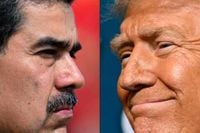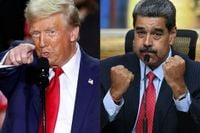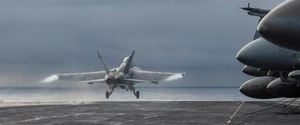The already fraught relationship between the United States and Venezuela has reached a boiling point, with both nations escalating rhetoric and military posturing in a standoff that has gripped the attention of the international community. Over the past week, events have unfolded at a dizzying pace, with the U.S. dramatically increasing the bounty on Venezuelan President Nicolas Maduro, deploying warships to the Caribbean, and Maduro vowing to mobilize millions of militia members in response.
According to Reuters, tensions ratcheted up on August 7, 2025, when the U.S. government raised the bounty for Maduro’s arrest to an unprecedented $50 million, up from $25 million earlier in the year and $15 million in 2020. The move, justified by Washington as part of its crackdown on drug trafficking, came alongside renewed accusations that Maduro leads the notorious Cartel de los Soles—a claim Maduro and his allies vehemently deny.
Just days later, the U.S. military announced the deployment of three Aegis guided-missile destroyers—the USS Gravely, USS Jason Dunham, and USS Sampson—off the coast of Venezuela. As detailed by Reuters, these warships form part of a broader anti-drug operation involving around 4,000 sailors and marines, with additional support from P-8 spy planes and at least one attack submarine. U.S. officials told Reuters that the naval assets would operate in international waters and airspace for several months, serving both surveillance and, if necessary, strike functions.
White House spokeswoman Caroline Leavitt made the Trump administration’s position clear on August 19, telling reporters, “He is willing to use the full power of the United States to stop the flow of drugs into the country. Maduro is not a legitimate president.” The U.S. has consistently refused to recognize Maduro’s election victories, a stance that has only deepened the diplomatic rift between the two nations, as reported by AFP and France 24.
Maduro, for his part, has responded with characteristic defiance. In a televised address carried by state media on August 18, he announced a sweeping plan to mobilize more than 4.5 million militia members across Venezuela. “This week, I will activate a special plan with more than 4.5 million militiamen to ensure coverage of the entire national territory—militias that are prepared, activated and armed,” Maduro declared, according to AFP. The militia, established by the late Hugo Chavez, is officially said to number around five million, though analysts and foreign observers question the accuracy of these figures given Venezuela’s population of approximately 30 million.
Maduro’s rhetoric has been nothing short of combative. He denounced what he called the “extravagant, bizarre, and outlandish threats” from the U.S. government, and called on his supporters to expand worker and peasant militias in every industry. “Rifles and missiles for the peasant force! To defend the territory, sovereignty, and peace of Venezuela,” he proclaimed. In a further show of resolve, Maduro thanked his supporters for standing firm against what he termed a “rotten refrain” of threats, as reported by AFP and France 24.
The Venezuelan government has not acted alone in its resistance. Interior Minister Diosdado Cabello, a key Maduro ally, has asserted Venezuela’s readiness to defend its maritime territory. “We are also deployed throughout the Caribbean...in our sea, our property, Venezuelan territory,” Cabello said, as cited by France 24. He went so far as to allege that the only drug cartel present in the region was the U.S. Drug Enforcement Agency (DEA), according to El Nacional.
Meanwhile, regional actors have weighed in with stark warnings. Colombian President Gustavo Petro recently stated that any attack on Venezuela would be viewed as an attack on Latin America and the Caribbean. “I don’t believe the solution to Venezuela’s political problems lies in paying to kill or capture political leaders,” Petro remarked, echoing concerns about the growing militarization of the dispute.
The U.S. administration, however, has shown no signs of backing down. Secretary of State Marco Rubio has repeatedly labeled the Maduro regime a “criminal enterprise,” accusing it of threatening U.S. oil companies operating lawfully in neighboring Guyana and of facilitating the flow of narcotics into the United States. “The Maduro regime is not a government. We have never recognized them as such. They are a criminal enterprise that basically has taken control of national territory of a country, who by the way are also threatening US oil companies that are operating lawfully in Guyana,” Rubio said in a video message reported by Reuters. He further asserted, “Anything that is a threat to the national security of the United States, he is going to confront.”
Amid the saber-rattling, the situation inside Venezuela remains tense. On August 19, Telesur reported the arrest of six individuals accused of plotting to bomb a parade at Venezuela Square in Caracas. Venezuelan authorities identified Carlos Arrieta, nicknamed “El Flaco,” as the alleged bomb-maker, and Ariannys Araujo, or “La Negra,” as the person who contacted Colombian gangs to facilitate the attack. The arrests have been presented by the Maduro government as evidence of ongoing threats to national security, both internal and external.
U.S. Deputy Secretary of State Christopher Landau, in a pointed message to Cabello on August 18, accused the Venezuelan leadership of devastating their homeland. “You and your gang of brutal criminals have destroyed your homeland in a way that few times in human history has a great country been so devastated. Last year’s elections and the tsunami of migration abroad clearly demonstrate to the entire world the absolute rejection by your own people,” Landau wrote, as reported by Reuters. “History shows how tyrants end.”
Yet, the narrative of Venezuela as a narco-state is not without its detractors. AP News reported in May that a declassified National Intelligence Council (NIC) assessment found no direct coordination between the Venezuelan government and the Tren de Aragua (TDA) criminal organization. While the report acknowledged a “permissive environment” that enables criminal activity, it concluded that the Maduro regime “probably does not have a policy of co-operating with the TDA and is not directing TDA movement to and operations in the US.” The Cartel de los Soles, meanwhile, has been described as evolving from a loose trafficking network into a system used to reward loyalty within the regime, rather than a straightforward criminal syndicate.
As both sides dig in, the specter of military confrontation looms large. Venezuelan Defense Minister Vladimir Padrino Lopez, writing in El Nacional, called for unity in the face of external threats: “Unity makes us invincible.” Whether this standoff will escalate into open conflict or remain a war of words and deployments is anyone’s guess. What’s certain is that the stakes—both for Venezuela’s sovereignty and for regional stability—have rarely been higher.





